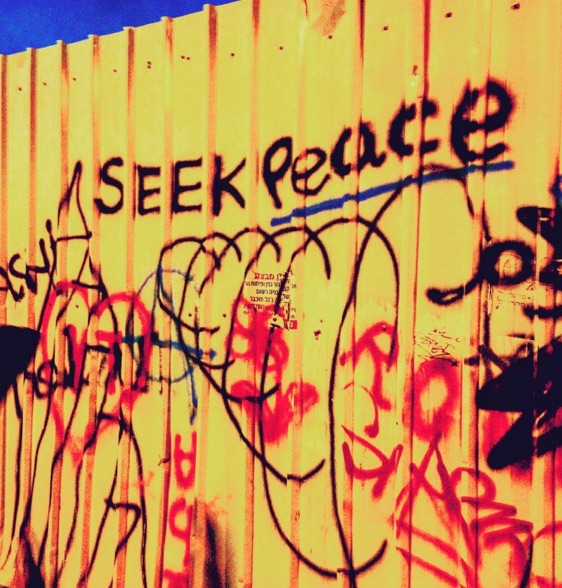
Here’s a song I wrote called, “Seek Peace,” based on the same passage from Psalms as the photo above. It’s a good one to listen to while reading this post.
I think about music a lot. One of the things I think about when I think about music is the idea that music is a vehicle for bringing greater peace into the world. My theory on this goes as follows: when a person is writing music, listening to music, singing, or playing a musical instrument they are engaged in a peaceful activity.
Speaking personally, when I write music my mind is filled with melody. When I listen to music, whether live or recorded, I feel lots of different emotions. When I sing with others I often feel a strong bond, a human bond. And when I’m playing guitar I’m at peace and, quite literally, holding an instrument of art and beauty rather than an instrument of violence and oppression. Music soothes me. It brings me home. And then it gets me going.
The two people I think of when I think about music as a vehicle for peace are Bob Marley and Yehuda Amichai.
I think of Marley’s great lyric from Trenchtown Rock, “One good thing about music, when it hits you, you feel no pain/ you feel okay. So hit me with music, brutalize me with music.” Once you’re done with “Seek Peace” upgrade the reggae vibe by checking out this video:
And as for Yehuda Amichai, Israel’s first and most enduring poet laureate, he wrote a beautiful poem that takes the prophetic idea of beating swords into plough shares one step further by suggesting that we then turn the plough shares into musical instruments so that we have to turn them back into plough shares before we can make them back into swords.
The idea that music is a vehicle for peace is something I cling to dearly.
But there’s a competing idea. The competing idea is that music is a vehicle for justice and for disrupting the social order.
Once I started thinking about the idea of music as a vehicle for justice and disrupting the social order I realized how very obvious it is. In many respects it’s even more obvious than the idea that music is a vehicle for peace. After all, it’s possible to mark eras of social change based on music. Lots of musicians have caused unrest through their music.
In terms of social aggravation, I turn again to reggae and think of Peter Tosh’s great song, “Equal Rights.” He says, “I don’t want no peace. I want equal rights and justice.” Unfortunately, peace doesn’t always mean equal rights and justice. There’s a sense in which peace has the unintended consequence (or intended consequence) of perpetuating a status quo in which oppression is part of what’s keeping the peace. Here’s Peter Tosh:
The good news for us musicians is that we don’t have to chose one or the other. We can create music for peace and music for justice. And if we’re lucky, or even better authentic, humble, and kind, we will find others to create it with us.
